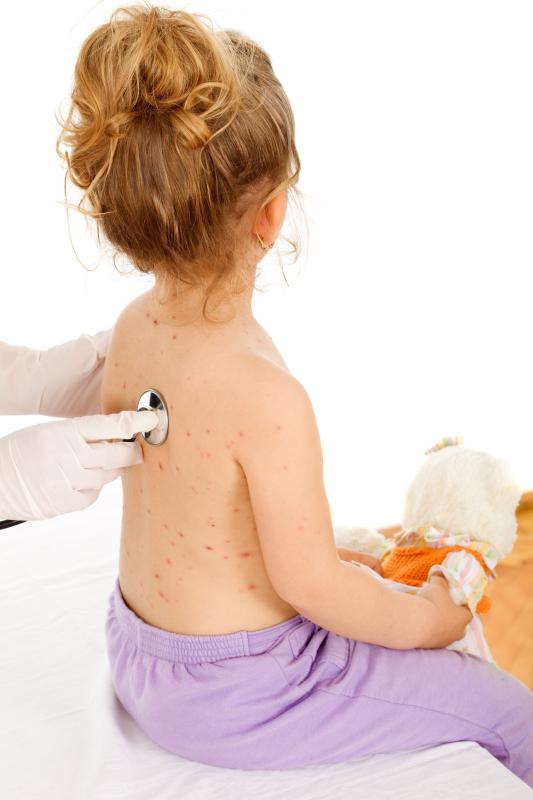At TheHealthBoard, we're committed to delivering accurate, trustworthy information. Our expert-authored content is rigorously fact-checked and sourced from credible authorities. Discover how we uphold the highest standards in providing you with reliable knowledge.
What is the Chicken Pox Vaccine?
The chicken pox vaccine or varicella vaccine is a relatively recent addition to vaccines available in many parts of the world. It was first used in the US in the mid 1990s, and it is now used in many countries. It contains a very weak form of the chicken pox virus that helps the body become immune to other exposures to the virus. Researchers estimate that it is effective about 90% of the time in preventing chicken pox, though effectiveness may decrease over time, and the shot may need to be repeated (if an active case of chicken pox doesn’t develop) every ten or so years.
Chicken pox isn’t known for being a terrible illness in most kids. It’s certainly uncomfortable, but most children who get it will have a relatively normal course of the disease and won’t have problems. A few children can develop secondary infections from the chicken pox sores, and there are some that may develop dangerous inflammation of the brain or things like pneumonia. Chicken pox can cause death, though this is rare.

Risk of complication increases as people age, and adults notoriously will have a harder time with the disease than do kids. This would suggest that people, who haven’t had a case of chicken pox prior to reaching adulthood, should probably get the chicken pox vaccine. It is not just a kid’s illness.
One of the hidden dangers with the varicella virus is that it can create shingles in older adults or those with compromised immune systems. About 20% of people who get shingles may develop an extremely painful condition called post-herpetic neuralgia, which can take a very long to heal. Thus preventing contagion with varicella may be wise from a long-term perspective.

However, there is a difference between the chicken pox and the shingles vaccine. The US Centers for Disease Control (CDC) recommends adults over the age of 60 get the shingles vaccine, called Zostavax®. This vaccination was approved in 2006, and is more effective in preventing shingles especially in older populations. The chicken pox vaccine, though, may still cause some prevention of shingles in adults younger than 60.

The schedule for giving chicken pox vaccine may vary. Some doctors recommend the first shot be given at about age one. Another shot is given between years four and six. Many physicians now recommend a booster shot when kids are about eleven or twelve. Some people will have mild reactions to the shot, and might develop a few chicken pox blisters, especially with the first shot, since the virus is alive, though weaker than normal. Mild fever and/or soreness at the shot site are the most common reactions.

There are some people that should not get the chicken pox vaccine. If people are allergic to neomycin or gelatin they could have a serious allergic reaction to the shot, though there is now a gelatin-free form available. People undergoing chemotherapy or radiation, who are pregnant, who have a moderate illness, who take steroids, or who have autoimmune conditions like lupus or HIV are advised to skip this vaccine too.
AS FEATURED ON:
AS FEATURED ON:














Discuss this Article
Post your comments